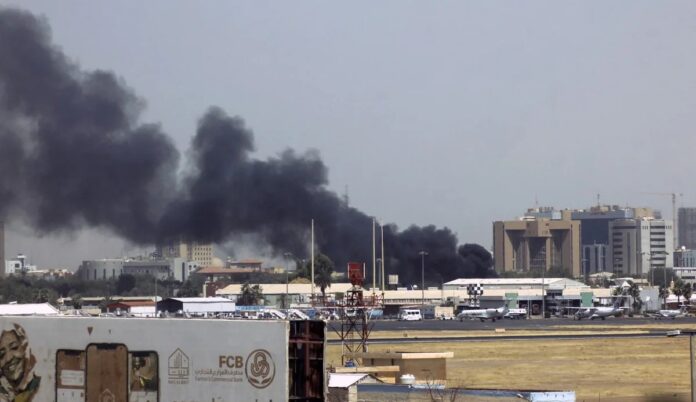| Translate This News In |
|---|
After a day of bloody combat between paramilitaries and the regular army that left at least 27 people dead and 170 injured, fighting continued into the early hours of Sunday in the capital of Sudan.
Witnesses report hearing gunfire and explosions on the deserted streets of Khartoum after the paramilitaries claimed possession of the presidential palace, the airport, and other crucial buildings.
The Sudanese air force issued a warning to stay indoors as it proceeded to conduct airstrikes against the paramilitary Rapid Support Forces (RSF) facilities late on Saturday. The army refuted the claims.
Earlier, fighter jets could be seen circling overhead.
According to AFP correspondents, during the fighting, windows shook and apartment buildings shook in numerous locations throughout Khartoum, and explosions could be heard early on Sunday.
The doctors’ union reported that at least 27 individuals had died, including two at the airport in Khartoum and the remaining 24 in various parts of Sudan.
In a statement early on Sunday, it was claimed that the fights also injured about 170 additional people.
Saudi Arabia’s national airline, Saudia, reported that one of its aircraft had “exposed to gunfire damage” while passengers and personnel were on board waiting to depart.
Bakry, 24, a marketer, claimed that people of Khartoum had “never seen anything like” the upheaval that had caused the capital to be enveloped in a thick cloud of smoky smoke.
“People were frightened and fled to their homes. The streets rapidly became empty, said Bakry, who only identified himself by his first name.
Abdel Fattah al-Burhan, the military chief, and Mohamed Hamdan Daglo, the paramilitary commander and al-Burhan’s deputy, had been at odds for weeks over the idea of integrating Daglo’s RSF into the regular army.
Along with Egyptian President Abdel Fattah al-Sisi and Chair of the African Union Commission Moussa Faki, UN Secretary-General Antonio Guterres demanded “an immediate cessation of hostilities” and discussed de-escalation strategies.
Along with Burhan and Daglo, he also spoke with them, pleading with them “to return to dialogue.”
Egypt and Saudi Arabia have asked for an immediate meeting of the Arab League to be held on Sunday to examine the situation in Sudan.
The US Secretary of State Antony Blinken, the foreign ministers of Saudi Arabia and the United Arab Emirates, and others highlighted “the importance of stopping the military escalation” in a conference call, the Saudi ministry reported.
Trading offences
The African and Arab regional blocs, the European Union, France, Italy, Russia, and Iran all made similar appeals.
Nevertheless, Daglo, also known as Hemeti, stated that “Burhan the criminal must surrender” in an interview with UAE-based Sky News Arabia.
After Burhan stated in an earlier statement that he “was surprised by Rapid Support Forces attacking his home at 9:00 am,” he denied that RSF were the ones who started the fight.
The army named Daglo a “wanted criminal” and the RSF a “rebel militia” on its Facebook page, stating that there “will be no negotiations or talks until the dissolution” of the organisation.
Two RSF bases in Khartoum, according to the military, were damaged by airstrikes. It uploaded a picture of black smoke rising from what it claimed was the RSF headquarters and claimed that the airport and other bases were still in its “full control.”
The signature of a deal with civilian factions outlining a plan for resuming the democratic transition that was stymied by the coup in 2021 has twice been postponed by negotiations between Daglo and Burhan.
In Omdurman, a sister city of Khartoum, witnesses reported violence surrounding the official media headquarters on Saturday. Conflicts were described elsewhere, including in the Darfur region.
Chad, a country that shares a border with Darfur, announced that it was closing its border “faced with this troubling situation.”
Gunfire woke me up
The US ambassador John Godfrey tweeted that he “woke up to the deeply disturbing sounds of gunfire and fighting,” echoing the pleas for a truce made by the military’s civilian interlocutors and former prime minister Abdalla Hamdok.
Daglo has claimed that the coup was a mistake that failed to usher in reform and re-energized Bashir’s administration, which was overthrown by the army in 2019 after widespread protests.
Under Bashir’s three-decade dictatorship, Burhan progressed through the ranks and insisted that the coup was required to include more groups in the democratic system.


















